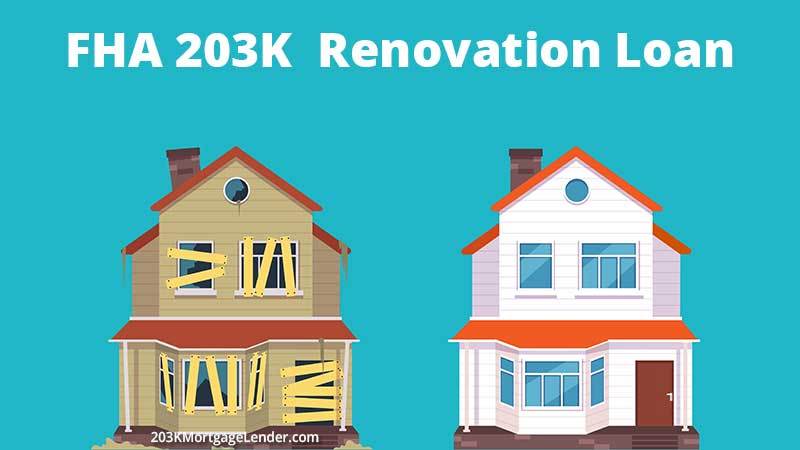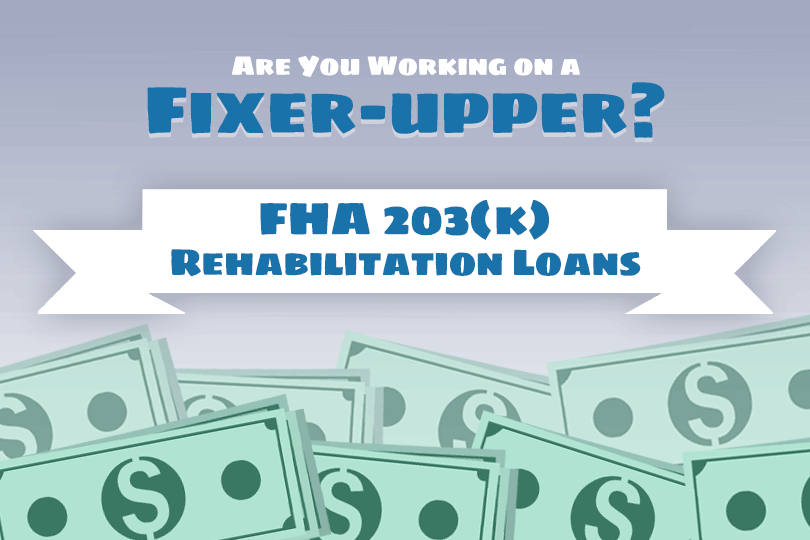Learn Why 203k Refinance is the Ideal Choice for Renovating Older Homes
Learn Why 203k Refinance is the Ideal Choice for Renovating Older Homes
Blog Article
Your Path to Home Improvement: Discover the Power of 203k Refinance Solutions
In today's real estate landscape, the 203k re-finance remedies stick out as a tactical alternative for home owners aiming to enhance their residential or commercial properties. This unique funding method not just simplifies the process of purchasing and restoring a home but additionally provides countless monetary benefits. Understanding the details of 203k fundings can illuminate pathways to substantial improvements and lasting value. Several remain uninformed of the details benefits and procedures entailed in leveraging this effective tool. What aspects should homeowners think about to optimize their investment potential?
What Is 203K Refinancing?
203K refinancing is a specific loan program made to facilitate home renovations and improvements by enabling home owners to fund both the acquisition of a residential or commercial property and the expenses of its rehab in a single home loan. This program, backed by the Federal Housing Administration (FHA), is particularly advantageous for homes that need considerable repair work or upgrades, offering a streamlined approach to safeguarding essential funds.
There are 2 main kinds of 203K financings: the Criterion 203K and the Minimal 203K. The Requirement choice is suited for extensive improvements and permits repair services surpassing $35,000, while the Limited alternative satisfies smaller tasks, commonly under that threshold. This flexibility makes it possible for debtors to deal with a variety of demands, from structural fixings to cosmetic updates.
To certify, debtors should fulfill certain FHA guidelines, consisting of credit report requirements and debt-to-income proportions. As part of the application procedure, an evaluation is conducted to figure out the residential property's value post-renovation, making certain the funding amount lines up with the projected renovations. In general, 203K refinancing offers an effective remedy for property owners aiming to enhance their living rooms while managing funding successfully.
Benefits of 203k Financings
Among the main advantages of making use of a 203k car loan is the capacity to finance both the purchase cost of a home and the expenses of needed improvements within a solitary home loan. This structured technique not just streamlines the home-buying procedure however additionally relieves the financial burden of securing different lendings for purchase and improvement.
Another significant advantage is that 203k loans permit buyers to purchase residential or commercial properties that require repairs, which can enhance the total worth of the home. This is especially beneficial in competitive real estate markets, where ready-to-move-in properties might be limited. Furthermore, buyers can tailor their home according to their individual preferences, changing a residence into a dream home.

Kinds Of 203k Financings
When taking into consideration the advantages of financing home improvements, it's crucial to comprehend the different alternatives offered under the 203k car loan program. The Federal Real Estate Management (FHA) provides 2 main sorts of 203k financings: the Requirement 203k and the Limited 203k.

On the other hand, the Limited 203k lending, also referred to as the Structured 203k, is planned for much less substantial jobs. Customers can use this alternative for small repair services and enhancements, with a maximum limit of $35,000. This kind find out here of financing is easier to handle, as it does not require the very same degree of oversight as the Requirement option.
Recognizing these 2 kinds of 203k lendings allows home owners to select the very best funding option for their remodelling requires, assisting in the awareness of their home improvement objectives.

Actions to Look For 203k Financing
Navigating the application process for 203k financing needs mindful prep work and understanding of the necessary steps included. Evaluate your eligibility by examining your credit score, income, and debt-to-income ratio, as these factors significantly impact your approval. Next, pick a certified lending institution experienced in 203k lendings, as they can guide you through the intricacies of the process.
As soon as you have actually recognized a lending institution, collect the needed paperwork, which usually includes income tax return, pay stubs, financial institution declarations, and a breakdown of the designated remodellings. This documentation sustains your monetary profile and renovation plans. 203k refinance. After assembling your documents, complete the lending application, ensuring that all details is precise and extensive
Following your application submission, the lending institution will conduct an assessment to figure out the residential property's value and the predicted worth after renovations. It is crucial to have a qualified specialist assess the improvement range and costs, as this will certainly be included in your funding request.
Finally, prepare for the closing procedure, where you will assess your car loan terms and finalize the financing for your anchor home improvement job (203k refinance). With persistance and organization, you can efficiently navigate the 203k financing application procedure
Tips for Effective Restorations
Effective remodellings call for precise preparation and execution to make sure that the project not only fulfills aesthetic goals yet also complies with financial constraints and timelines. Begin by specifying clear objectives for your remodelling; this will certainly guide every decision you make. Involve a reliable specialist that understands your vision and has a tested performance history with 203k tasks, as their competence can dramatically enhance the outcome.
Establish a thorough budget that includes all prospective expenses, such as products, labor, and unanticipated costs. It is a good idea to reserve a contingency fund of a minimum of 10-15% to accommodate unpredicted problems. Develop a practical timeline, considering possible hold-ups, and interact this with your professional to take care of assumptions efficiently.
Consistently keep track of the project's progression against your strategy, making modifications as required. By sticking to these ideas, you can achieve an effective check it out restoration that not only boosts your home's value yet likewise creates a room that reflects your one-of-a-kind style and demands.
Final Thought
The 203K refinance remedy functions as an essential tool for homeowners intending to enhance building value via remodellings. By incorporating purchase and improvement costs right into a solitary home loan, these loans assist in financial availability and flexibility. With a range of alternatives available, prospective consumers can choose one of the most suitable kind of 203K financing for their particular requirements. Inevitably, prudent planning and efficient implementation of remodellings can cause substantial long-lasting advantages, making certain a worthwhile financial investment in the residential property.
Report this page